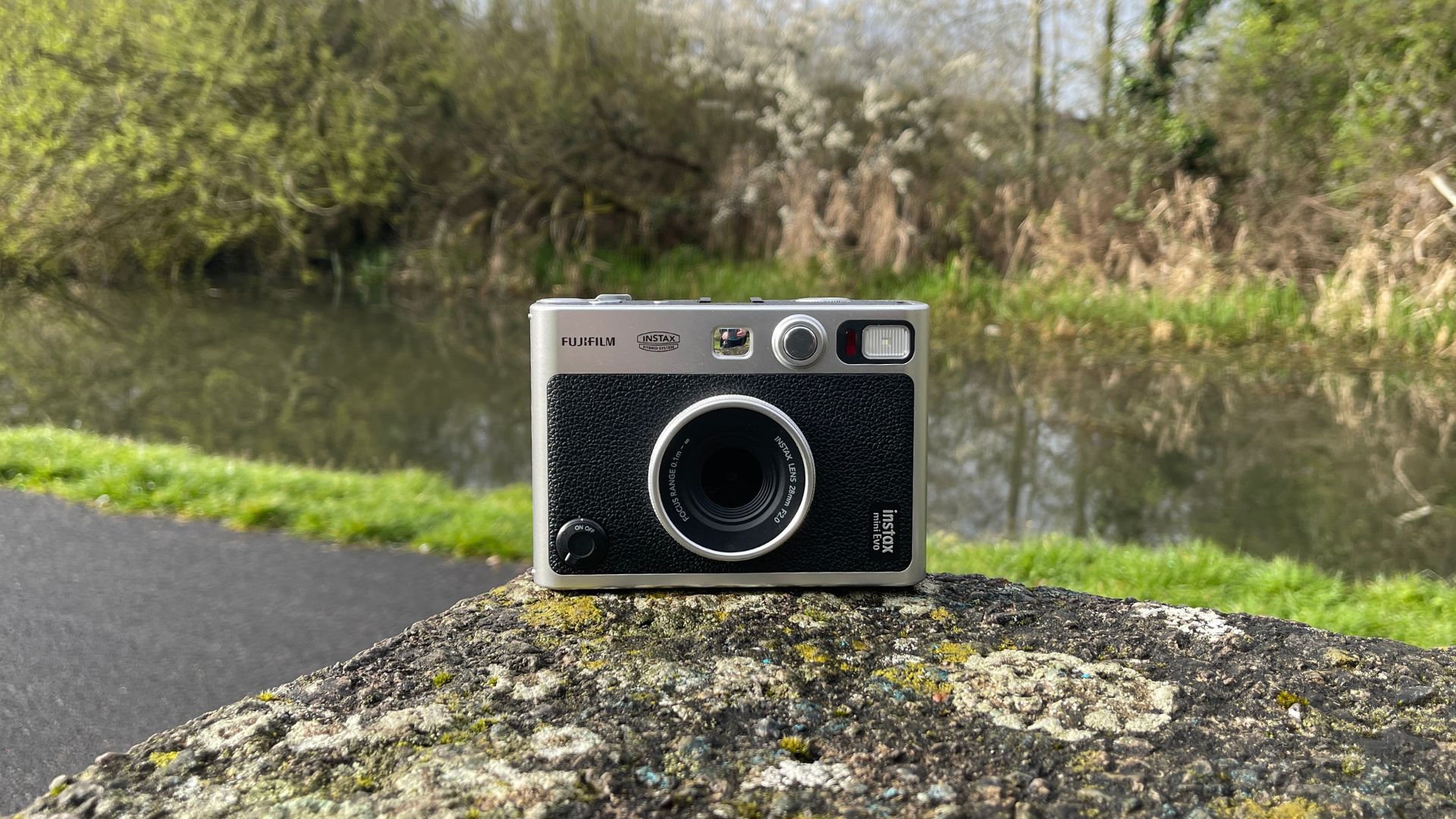
Type: Hybrid instant camera
Pixels: 4.9MP, 2560 × 1920
CMOS sensor: 1/5 inch
Size: 87mm x 122.9 x 36mm
Weight: 285g
Screen: 3-inch LCD
Filters: 10 film effects
Self-timer: Yes
Film developing time: 2-3 minutes
Aperture: F2.0
Shutterspeed: ¼ to 1/8000 second
Storage: MicroSD
Internal memory? Yes, 45 images
Battery: Rechargeable Lithium-ion
The Fujifilm Instax Mini Evo camera is an instant camera that combines retro design with modern digital functionality to produce vibrant instant prints. This hybrid is compact, lightweight and highly portable, making it perfect for travel or on-the-go use.
The Mini Evo is easy to use, even for first-time camera users. The controls are simple and straightforward, and the camera features a clear LCD screen that makes it easy to frame your shots. The camera also has a built-in flash that can be used in low-light conditions making sure you never miss a moment. Check out our roundup of the best instant cameras on the market if you want to rediscover the joy of printed pictures.
The 4.9-megapixel image sensor, built-in 28mm (equivalent) F2.0 lens, and 1/5-inch CMOS sensor with primary colour filter mean that this is designed more for fun and creativity than high-end technical photography. But don’t let that put you off, with a variety of film and lens filters as well as intuitive controls, it’s a camera that will create stunning images in any setting while also producing high-quality, credit-card-sized prints that make perfect keepsakes for you and your mates. This is a great camera for photography newbies, but priced at £174.99, it isn’t the cheapest instant camera on the market. If you’re ready to put down your smartphone and pick up a camera, then our guide on the best cameras for beginners should help you find the perfect option to hone your photography skills. While this is an excellent camera for younger users, if you find the price tag a bit high, then it’s worth looking at our guide to the best cameras for kids.
I tested this camera out for a couple of weeks, taking it with me when I was out and about and shooting some candid shots at home. I experimented with all the different lenses and film effects to create different styles of photography. As well as testing all the creative aspects of this camera, I also paid attention to how good the display was and how well the battery performed.
Fujifilm Instax Mini Evo Review: Design
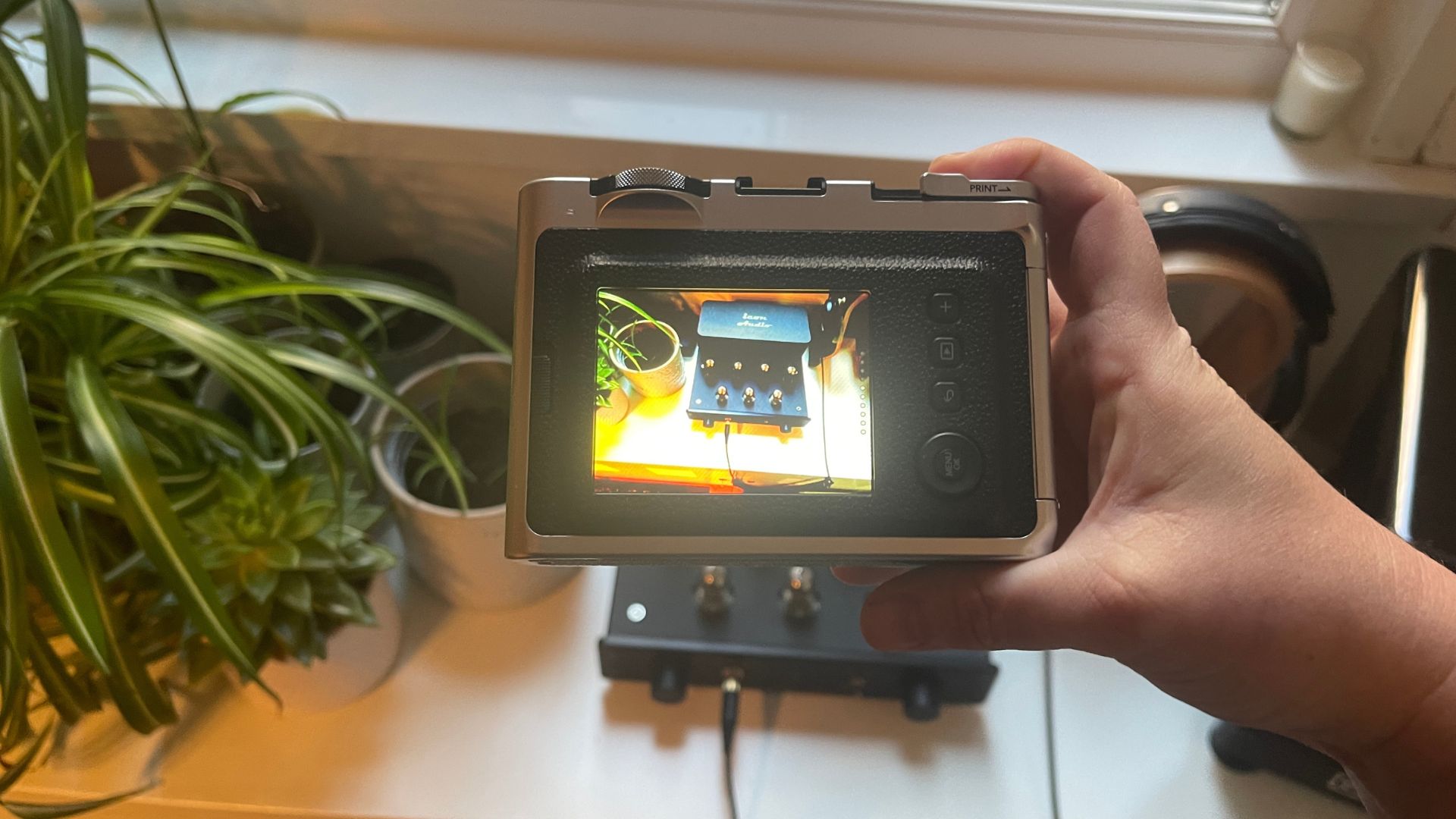
The Fujifilm Instax Mini Evo is one of the better-looking instant cameras on the market. They’ve not gone down the cartoonish route that other makes have, instead opting for a retro-inspired design that is a love letter to Fujifilm classic film cameras of the past. The black faux leather surface and silver surround are actually made from textured plastic which allows the camera to feel lightweight while still being easy to grip and handle.
Everything about the Instax Mini Evo has been designed to make it super easy to use. The lens at the front only slightly protrudes, so storing it in your coat pocket or handbag is a breeze. The lens also has a dial which, rather than being used for focusing the camera as you’d expect, actually scrolls through some of the lens effects. The front of the camera also houses what I think is a superb design feature, a selfie mirror that also doubles up as a second shutter button. Because this camera is better when used in portrait mode, the front shutter button means it’s easy to click when you’re holding it that way.
There is an additional shutter button on the top of the camera which can also be used to auto-focus and get the shot perfect. On top of the camera, there’s also a mode dial which scrolls through the various film effects and, again, throwing back to the old days, a lever which you pull when you’re ready to print your image.
Surprisingly, given how basic this camera appears, there’s also a shoe mount fitting, which you can add fit accessories such as an external flash and the bottom of the camera also features a standard tripod socket, so group shots are made a lot easier.
There’s no viewfinder with this camera; instead, you frame your shots using the 3.0-inch TFT colour LCD screen. This isn’t a touchscreen, but you use the various buttons and dials on the camera to scroll menus and change the settings.
Those who remember using analogue film cameras or have used Polaroids before will rejoice in how easy it is to load the film in this camera. Once the back is open the cartridge just slots right in, and once a test print has been made, it’s good to go. No spending ages fiddling with loading paper or winding on the film.
Features
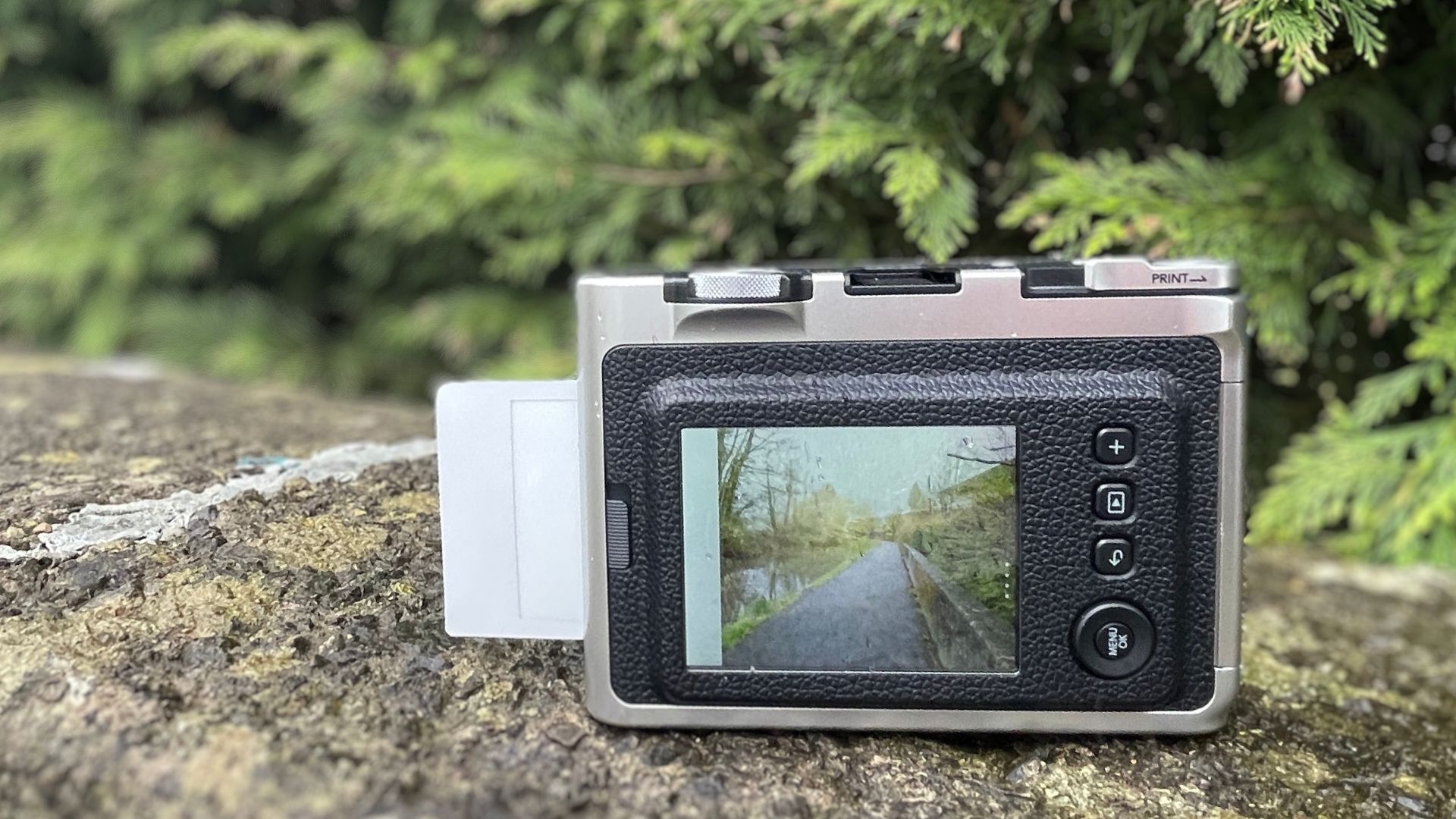
While analogue fans may wonder what the point of a hybrid camera is, the beauty of the Instax Mini Evo is the LCD screen allows users to preview their shots before sending them to print. The hybrid design also means you can continue to shoot even if you’ve run out of film and with just 10 prints per cartridge, that's pretty easy to do.
The internal battery can’t be removed or swapped over, but it’s pretty decent, handling around 100 images on a full charge. But even when it does run flat, it only takes up to 3 hours to fully charge.
The Instax Mini Evo has an onboard memory of around 40-45 shots, but there is a microSD card slot if you wish to expand that.
Another great feature of this camera is that it has onboard Bluetooth connectivity. This means you can pair it up with your smartphone and by using the Instax Mini Evo Direct Print app, print images direct from your phone. If you’re printing directly from the camera, then the print process is very fast, taking around 20 seconds to print and then about 2- 3 minutes for the image to fully develop.
Creativity really is a big thing with this camera, and there’s plenty of scope for playing with your images. There are ten integrated lens modes and ten film modes which, when combined, can provide up to 100 different effects.
Photo quality
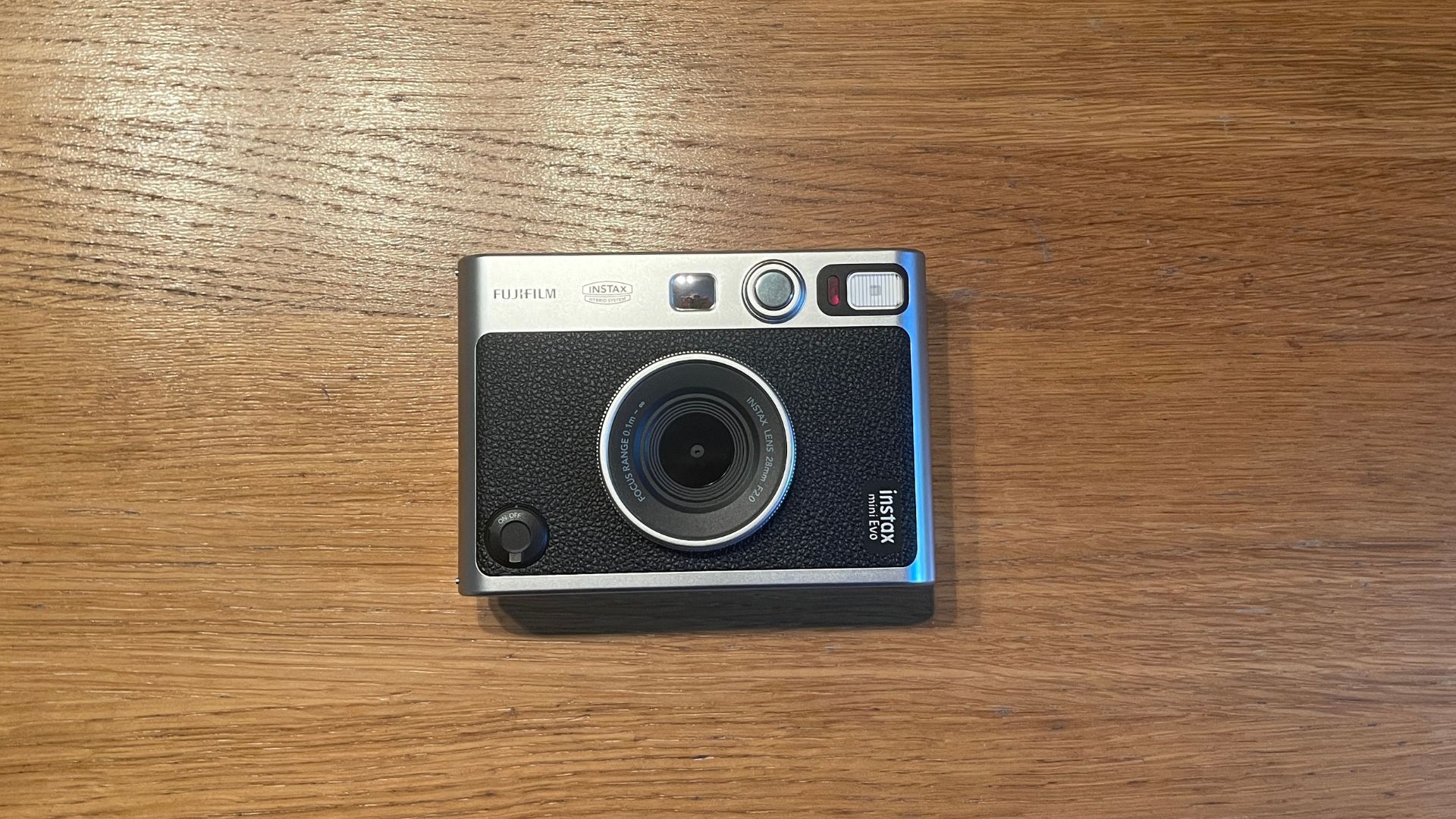
With iPhones having 12-megapixel cameras, this 4.9-megapixel offering won’t blow you away. However, for the credit card-sized prints this camera produces, the images are pretty good. I set the print quality to “Instax rich” which gave excellent definition and punchy colours.
The one thing with this camera I found was that you need to have good light to take anything decent, of course, it does have a built-in flash which helps with that but anything taken in low light wasn’t really in focus and didn’t have a good amount of detailing. Although, it does create a slight catch-22 situation as the LCD screen, while fabulous in low light, in bright light is pretty impossible to see.
There are two ways to transfer your digital images from the camera to your computer (or smartphone). You can use the app, which will automatically add the Instax border and give you options to edit the image, these come out at around 1080 x 1080 so perfect for Instagram. Or there's the full-resolution JPEGs which can be transferred off the microSD card, these images are around 2560 x 1920, they’re pretty basic, try to get any larger, though, and you’ll lose any kind of quality that you had. With that in mind, this camera really is just for printing instants or for images that are going to be posted on your socials. If you’re interested in any kind of serious photography, then you’re going to be disappointed.
Price
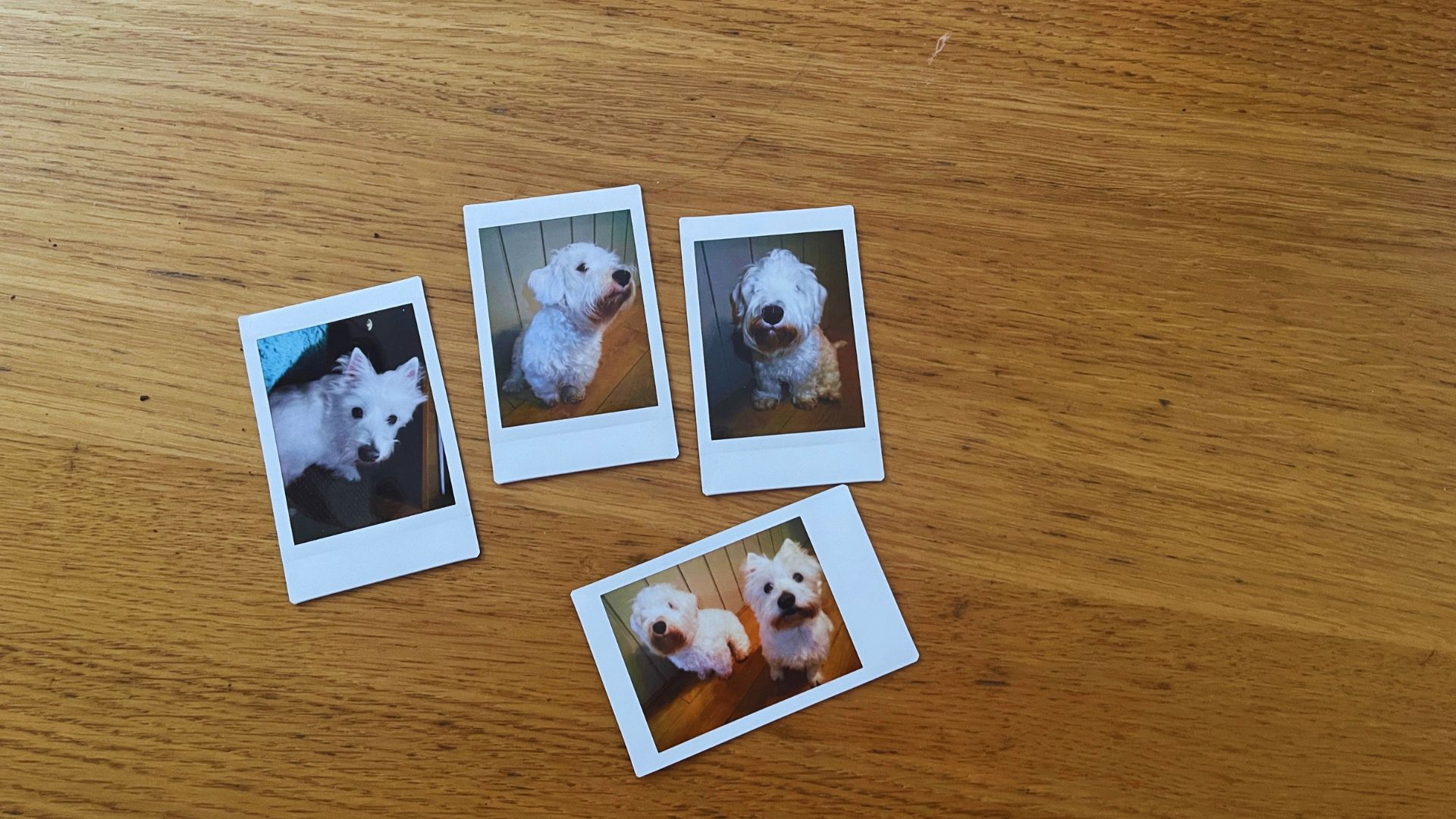
The Fujifilm Instax Mini Evo is priced at £174.99, and a 20-pack of colour film will set you back £14.99. Of course, one of the good things this hybrid has over an instant camera such as the all-instant Instax Mini 12 is that you do have the LCD screen to determine if your image is good enough to print before you pull the lever. That saves wasting printer paper and gives you the option to perhaps come back to print the image at a later date.
Another option that Fujifilm is offering is the instax mini LiPlay which is a lot smaller, in fact the smallest instax camera, but ideal for those nights on the town when you only have a clutch bag. This camera is priced at £149.99 and comes with a few extra features such as the ability to record sound, which is then accessed by a QR code printed on the image, and filters such as bunny ears which you’d find on social apps such as Snapchat or Instagram.
The other option, if you prefer the camera on your smartphone but love the idea of instant prints is to purchase an instant film printer. Fujifilm offers the INSTAX mini Link 2 SE, which can also link to the Nintendo Switch in-game memories. These start at £114.99 but offer a lot more freedom.
Should I buy the Fujifilm Instax Mini Evo?
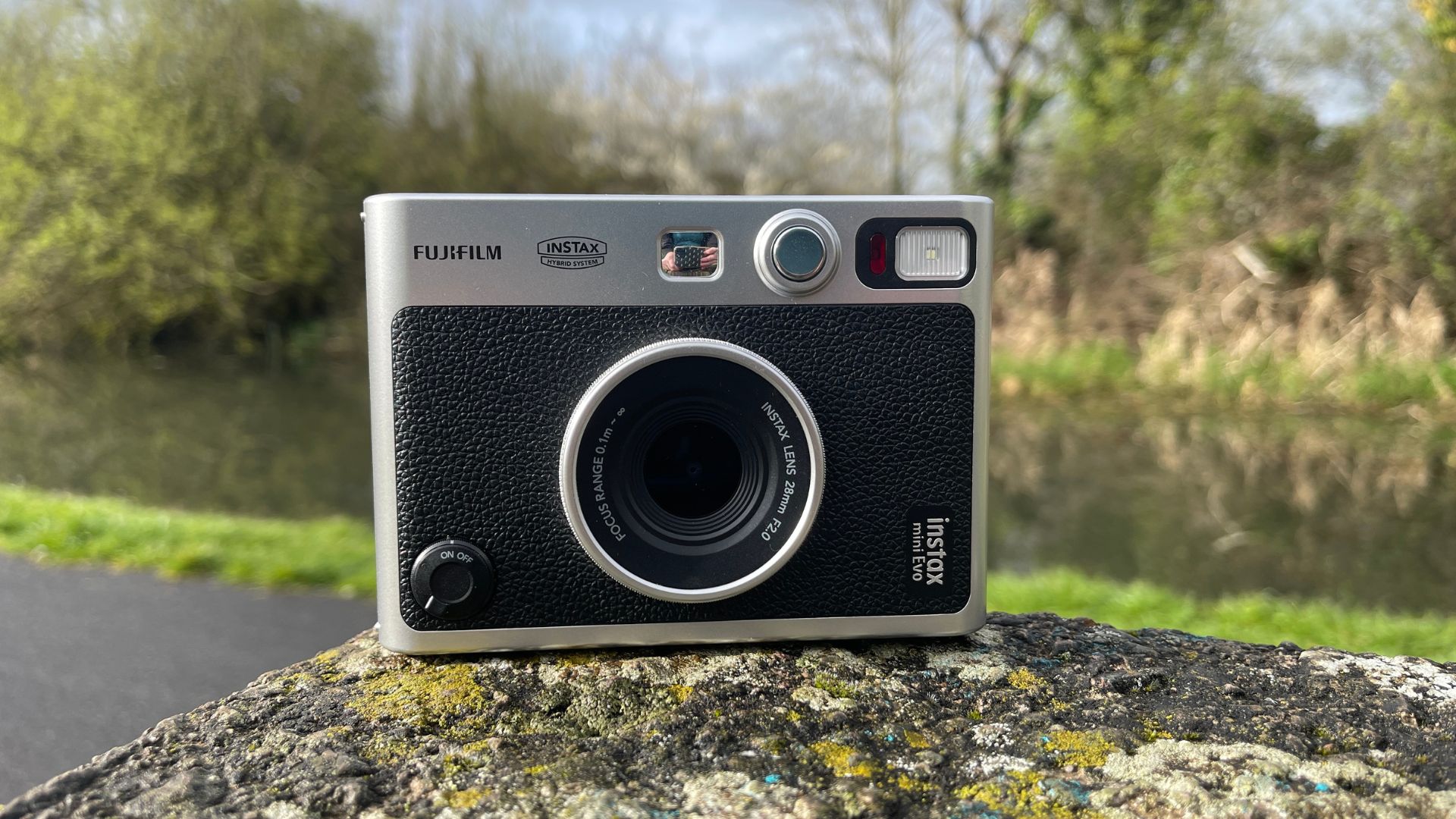
The Fujifilm Instax Mini Evo is a fantastic hybrid camera that gives you all the joy of digital photography with the fun of an instant camera. Whether you remember playing with polaroids from your childhood or just the trundle to the printing shop to get your snaps, then you will love the nostalgic feeling this camera gives you.
It’s also a great choice for anyone who's getting started on their photography adventures. Its simple, straightforward and easy-to-use buttons and functions are ideal for beginners who want to break free of their smartphones and experience a real camera in their hands.
It’s also brilliant for anyone who likes to play with filters and lens effects, as there are over 100 combinations, so you can really let your creativity loose.
That said, it is pricey, at £174.99 for the quality of images that it produces. It is also hard to get past its gimmicky nature, and despite the different features, I wonder how long it’ll be before the novelty wears off.
But maybe that’s what Fujifilm are creating, something that goes against the mindless snapping of the smartphone and brings the fun and creativity back into photography. If you have the money and you want the challenge, then certainly buy the Fujifilm Instax Mini Evo and start creating tangible reminders of your memories.







